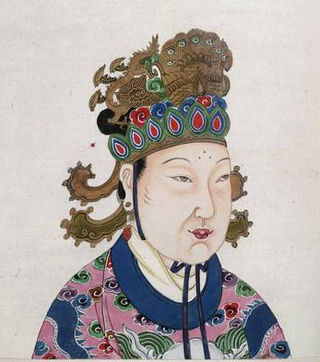
Wu Zetian, personal name Wu Zhao, was the de facto ruler of the Tang dynasty from 665 to 705, ruling first through others and then in her own right. From 665 to 690, she was first empress consort of the Tang dynasty and then, after his death, empress dowager. Unprecedented in Chinese history, she subsequently founded and ruled as female emperor of the Wu Zhou dynasty of China from 690 to 705. She was the only female sovereign in the history of China widely regarded as legitimate. Under her 40-year reign, China grew larger, becoming one of the great powers of the world, its culture and economy were revitalized, and corruption in the court was reduced. She was removed from power in a coup and died a few months later.

Emperor Gaozong of Tang, personal name Li Zhi, was the third emperor of the Tang dynasty in China, ruling from 649 to 683; after January 665, he handed real power to his second wife Empress Wu. Emperor Gaozong was the youngest son of Emperor Taizong and Empress Zhangsun; his elder brothers were Li Chengqian and Li Tai.

Zhangsun Wuji, courtesy name Fuji (輔機), formally the Duke of Zhao, was a Chinese politician who served as a chancellor in the early Tang dynasty. He was Empress Zhangsun's brother, which made him a brother-in-law of Emperor Taizong and a maternal uncle of Emperor Gaozong. He was an important advisor to Li Shimin when the latter was still the Prince of Qin during the reign of his father, Emperor Gaozu. He helped Li Shimin overcome his brothers Li Jiancheng and Li Yuanji in a succession struggle at the Xuanwu Gate Incident, eventually enabling Li Shimin to become the heir apparent and later the emperor. He was also instrumental in Emperor Taizong's selection of Li Zhi as the Crown Prince, and was exceedingly powerful after Li Zhi took the throne as Emperor Gaozong. However, he gradually fell out of his nephew's favour by failing to support Emperor Gaozong's decision to depose his first wife, Empress Wang, and replacing her with Empress Wu, especially after the beginning of the new year 657 with the power of Empress Wu fell more. In 659, Zhangsun Wuji was falsely accused of treason by Empress Wu's political ally, Xu Jingzong, and eventually ordered to be sent into exile by Emperor Gaozong. Xu Jingzong subsequently sent the official Yuan Gongyu (袁公瑜) to force Zhangsun Wuji to commit suicide on his way to exile.
Li Zhong (李忠), courtesy name Zhengben (正本), formally Prince of Yan (燕王), was a crown prince of the Chinese Tang Dynasty. He was the oldest son of Emperor Gaozong and was created crown prince in 652 even though he was not the son of his then-wife Empress Wang. After Empress Wang was displaced by Empress Wu in 655, however, Li Zhong was caught in Empress Wu's crosshairs and was forced to yield the crown prince position to his younger brother Li Hong, born of Empress Wu, in 656. He was later further reduced to commoner rank and put under house arrest, and when the chancellor Shangguan Yi failed in his attempt to persuade Emperor Gaozong to depose Empress Wu in 664 and was executed, Empress Wu took the opportunity to accuse Li Zhong of being complicit in Shangguan's plans. Around the new year 665, Emperor Gaozong at the urgent request of Empress Wu ordered Li Zhong to commit suicide. He was posthumously honored an imperial prince, but not a crown prince, during the second reign of his brother Emperor Zhongzong.
Xu Jingzong, courtesy name Yanzu, posthumously known as Duke Gong of Gaoyang, was a Chinese cartographer, historian, and politician who served as a chancellor in the Tang dynasty. Allied with Emperor Gaozong's powerful wife, Empress Wu, Xu Jingzong was exceedingly powerful and effective throughout most of Gaozong's reign. By order of Empress Wu, he played a major role in the elimination of the chancellors opposed to her, between years 657 to 659 and 665.
Yu Zhining (于志寧) (588–665), courtesy name Zhongmi (仲謐), formally Duke Ding of Yan (燕定公), was a Chinese politician during the Tang dynasty, during the reigns of Emperor Taizong and Emperor Gaozong. He had served on the staff of Emperor Taizong's oldest son and crown prince Li Chengqian and, after Li Chengqian was removed for plotting to overthrow Emperor Taizong in 643, received approval for having tried to correct Li Chengqian in his ways. Emperor Taizong promoted him, and he subsequently played prominent roles in the imperial government late in Emperor Taizong's reign and early in Emperor Gaozong's reign. In 659, however, because he had previously not supported the ascension of Emperor Gaozong's second wife Empress Wu, he was removed from his office based on accusations by her ally Xu Jingzong that he had conspired with Emperor Gaozong's uncle Zhangsun Wuji, who had opposed Empress Wu's ascension.
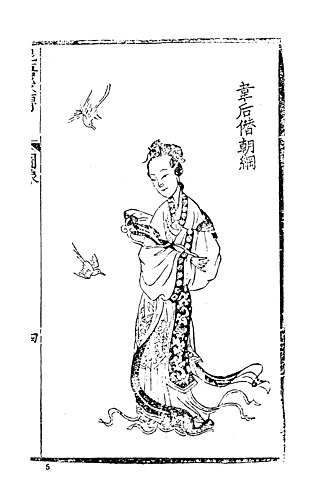
Empress Wei was an empress consort of the Chinese Tang dynasty. She was the second wife of Emperor Zhongzong, who reigned twice, and during his second reign, she tried to emulate the example of her mother-in-law Wu Zetian and seize power. She was de facto in charge of the governmental affairs during her husband's reign, though she was not formally regent. Emperor Zhongzong's death in 710 — a death traditionally believed to be a poisoning she carried out together with her daughter Li Guo'er the Princess Anle — made the empress dowager, and she took formal power as regent de jure during the minority of Emperor Shang of Tang. After a reign of seventeen days as regent, she was overthrown and killed in a coup led by Emperor Zhongzong's nephew Li Longji and Emperor Zhongzong's sister Princess Taiping.

Lady Wu: The First Empress, also known as The Great Empress or Empress Wu Meiniang, is a 2003 Chinese television series based on the biography of Wu Zetian, the only woman in Chinese history to assume the title of Empress Regnant. The series was first broadcast on CTS in Taiwan in 2003 under the Chinese title 武媚娘傳奇.

The Rise of the Tang Empire is a Chinese television series based on the events in the Zhenguan era during the reign of Emperor Taizong of the Tang dynasty. The 50 episodes long series is directed by Zhang Jianya and written by Ah Cheng and Meng Xianshi. It was first broadcast on BTV in China in December 2006.

Love Legend of the Tang Dynasty, also known as Da Tang Qing Shi, is a Chinese historical television series based on the legend of an illicit romance between the Tang dynasty Princess Gaoyang and a monk called Bianji. The series was directed by Gong Ruofei, starring Tang Guoqiang, Shen Aojun, Nie Yuan, Zhang Tong, Pan Yueming, Pan Yaowu, and Qin Lan. It was first broadcast in mainland China in 2001.
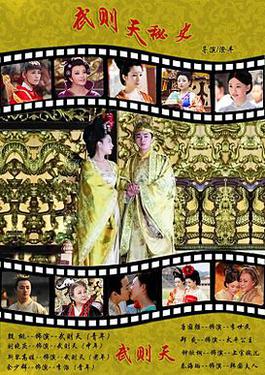
Secret History of Empress Wu, also known as Wu Zetian Mishi, is a Chinese television series based on the life of Wu Zetian, the only woman in Chinese history to assume the title of Empress Regnant. The series was directed by Cheng Feng and starred three actresses — Yin Tao, Liu Xiaoqing and Siqin Gaowa — as Wu Zetian, each playing the empress at a different stage of her life. It was first broadcast in mainland China on Hunan Satellite TV on 5 November 2011.

Tang Ming Huang is a Chinese television series based on historical events in the reign of Emperor Xuanzong of the Tang dynasty. The series was directed by Chen Jialin and starred Liu Wei as the eponymous emperor. It was first broadcast on CCTV-1 in 1990 in mainland China.

Wu Zi Bei Ge, also known as Wu Zi Bei Ge: Wu Zetian Zhuan, is a 2006 Chinese television series based on the life of Wu Zetian, the only woman in Chinese history to assume the title of "Empress Regnant". The series was directed and written by Chen Yanmin, and starred Siqin Gaowa and Wen Zhengrong as the empress. The series' title Wu Zi Bei Ge literally means "Song of the Uncharactered Stele", with the "stele" referring to the unmarked one standing near Wu Zetian's tomb at the Qianling Mausoleum.
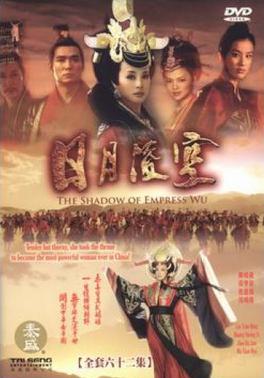
The Shadow of Empress Wu, also known as Riyue Lingkong, is a Chinese television series about the relationship between Wu Zetian, the only female emperor in Chinese history, and Xie Yaohuan, a fictional female official serving in Wu's court. The series was directed by Lu Qi and starred Liu Xiaoqing, Eva Huang, Vincent Jiao, Ma Xiaowei and Yang Zi in the leading roles. It was first broadcast on CCTV from August 2007 to January 2008 in mainland China, and in November 2008 on HD Jade in Hong Kong.
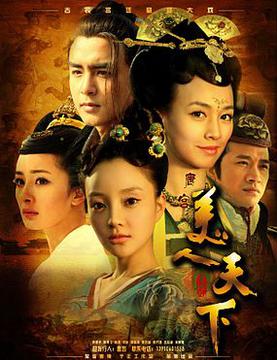
Beauty World, also known as Tang Gong Meiren Tianxia and World of a Beauty, is a Chinese fantasy-supernatural television series set in the Tang dynasty. It was directed by Lee Wai-chu, produced and written by Yu Zheng, and starred Zhang Ting, Ming Dow, Li Xiaolu, Mickey He, Zheng Guolin, Yang Mi and Tong Liya in the leading roles. The series is regarded as a counterpart to Beauty's Rival in Palace, a similar 2010 television series set in the Han Dynasty. It was first aired on 21 October 2011 on Guangzhou Zonghe Channel in mainland China.

Secret History of Princess Taiping, also known as Taiping Gongzhu Mishi, is a 2012 Chinese historical television series. The protagonist is the firstborn daughter of Wu Zetian, the only female emperor in Chinese history. However, in this television series, the princess survived, and when she grows up she impersonates her younger sister Princess Taiping to take revenge on her mother and attempts to seize the throne for herself. Directed by Lee Hon-to and Zhou Min, the series starred three actresses — Alyssa Chia, Zheng Shuang and Lin Miaoke — as Princess Taiping, each playing the princess at a different stage of her life. It was first broadcast in mainland China on Hunan Satellite TV on 27 March 2012.
The Empress of the Dynasty is a Taiwanese television series based on the life of Wu Zetian, the only female emperor in Chinese history. Directed by Li Yueh-fung and produced by Lin Hui-chun, the series starred Angela Pan as Wu Zetian. It was first broadcast in Taiwan on CTV from 18 November 1985 to 10 January 1986.

The Empress of China is a 2014 Chinese television series based on events in the 7th and 8th-century Tang dynasty, starring producer Fan Bingbing as the titular character Wu Zetian—the only female emperor in Chinese history.

Heroes of Sui and Tang Dynasties 1 & 2 is a 2012 Chinese historical television series directed by Li Hantao. It was first aired on Hunan Television in China in 2012. The series is based on the events in the reign of Emperor Yang of Sui during the Sui Dynasty and Tang Dynasty. The series stars Dicky Cheung, Winston Chao, Liu Xiaoqing, Yu Shaoqun, Wezei, Kou Hsi-Shun, Yoki Sun, Jang Seo-hee, and Lan Yan. It is followed by the sequel Heroes of Sui and Tang Dynasties 3 & 4.














